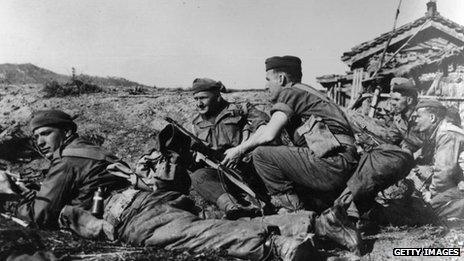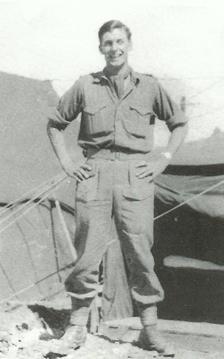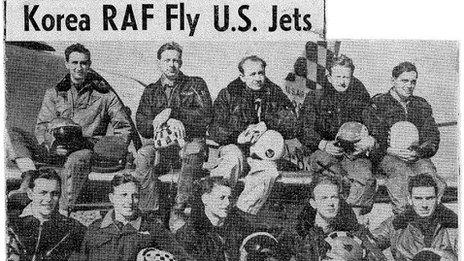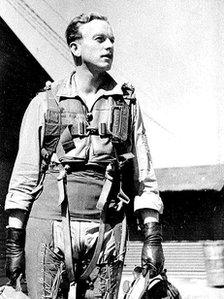Remembering the veterans of 'forgotten war'
- Published

The British contingent was mostly made up of young national servicemen
Just a handful of years after World War II ended, the US, Britain, China and many more countries became embroiled in another conflict lasting three years and whose death toll is thought to be in the millions. Yet the Korean War is often referred to as the "forgotten war" by British veterans of it.
"It was a war that seemed extremely remote, the other side of the world," says Keith Taylor, who served as a 2nd Lieutenant with the Royal Northumberland Fusiliers. "Most people had no idea where Korea was, and had even less idea what the war was about."
In fact, as the Cold War turned hot for the first time, it involved a fundamental battle between democracy and communism.
After the Soviet-installed communist dictatorship of North Korea invaded South Korea in June 1950, the US led a United Nations force from numerous countries that drove the North Koreans back.

2nd Lt Taylor fought in Operation Commando, a major assault on Chinese positions in 1951
When the UN troops then advanced into North Korea and closed in on the Chinese border, aiming to unify Korea under a pro-Western government, communist China joined the war against the allies.
"It was stalling and restricting the spread of communism into that very important peninsula of Korea," says Mr Taylor, an 81-year-old Londoner now living in the US.
"It was the right thing to do at the time," he adds. "It was very challenging and, of course, it lasted three years which was much longer than people had expected."
On the occasion of the 60th anniversary of the end of the war, British veterans who served in the Korean War are being honoured with a parade in central London and thanksgiving service at Westminster Abbey.
When an armistice was signed to bring an end to hostilities on 27 July 1953, in territorial terms the two sides were almost back to where they had started.
One of about 100,000 British troops who served during the war, Mr Taylor was 19 when he was sent along with many other teenage national servicemen who had barely left their home counties before, let alone the UK.
'What you signed up for'
"It was a pretty vertical learning curve," says Mr Taylor, of a campaign involving extremes of weather, equipment shortages and unpalatable rations, mosquitoes, and periods of tedious inactivity in the trenches interspersed with ferocious battles often featuring hand-to-hand combat.
More than 1,000 British troops were killed, almost 3,000 wounded, and a further 1,000 or so were missing or taken prisoner.
Mr Taylor recalls: "When bodies had been recovered of those who died in our regiment, they were laid out on the ground for officers to go and pay their respects to them before they were taken away.
"It was very, very emotionally disturbing to see people who you knew well and had served with and who were now dead, and it takes some believing.
"It was done with great dignity and respect, and it was a very sharp reminder of what was happening and what it was all about."
Flight Lieutenant John Murphy was one of a small number of British pilots who received training from the US Air Force to fly American fighter jets close to the Chinese border in the war.
"I considered myself very lucky to go," says Mr Murphy, whose 32 missions in Korea earned him a US air medal and were the only combat he saw in an RAF career that lasted until 1966. "It was quite literally a once-in-a-lifetime experience."
Overwhelming gratitude
He recalls: "We had a tangle with one [enemy aircraft] and sent him spinning down to the earth, but they couldn't find the wreckage so we couldn't claim anything with it. We got a 'probable'.
"That's what you signed up for," he adds.

A few British pilots joined US Air Force fighter jet sweeps, protecting fighter-bombers from enemy attacks (Flt Lt Murphy seen front row, second from right)
While British veterans feel the war is treated as no more than a historical footnote at home, those who have been back to South Korea are usually overwhelmed by displays of the gratitude ingrained in people of all ages there.
"It was quite amazing the way the Koreans looked after us," says Mr Murphy about a veterans' trip he made just three years ago. "Children would come up to us and want to have their photo taken with us. Little groups, when we walked by, would applaud.

Flt Lt Murphy received the US air medal for "meritorious achievement in aerial flight"
"I didn't expect to be applauded in my life. They treated us like royalty actually."
He adds: "We knew we were helping to keep South Korea free. If the United Nations hadn't intervened, the chances are there would just be one Korea. They are unbelievably grateful to the UN."
The 60th anniversary events in the UK are explicitly aimed at recognising "the bravery and dedication of those who fought", with government defence minister Mark Francois saying Britain's role "should never be forgotten".
"War has a very uniting effect on people and you share a common situation, I am pleased to say, with enormous courage and fortitude," says Mr Taylor.
"Of course, with the passage of time there are less and less of the Korean veterans around to attend these things."
All the more reason then, while some of their number are still with us, to remember those who fought the "forgotten war".
- Published11 July 2013
- Published9 July 2012
- Published7 April 2013